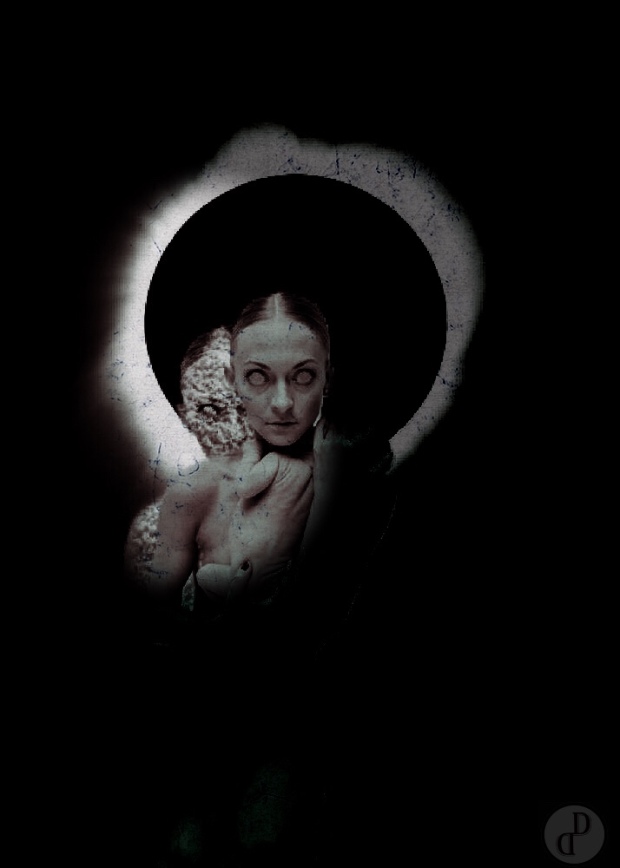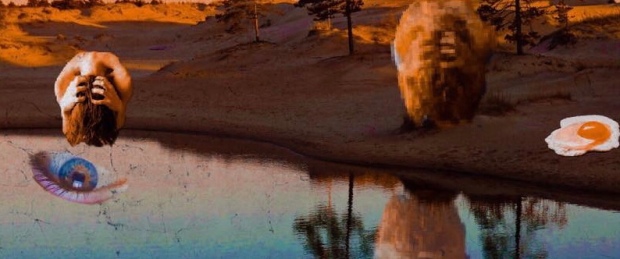by
Daulton Dickey
Part IV
[Click here to read Part I, here for Part II, and here for Part III]
I.
My stomach cramps and I drop to my knees. Pain tears through me. It won’t stop. Stop. It won’t stop. Tearing through me: pain. The sounds around me oscillate from one ear to the other. My stomach contracts like a beating heart, my legs tremble, and everything feels as if someone has tilted the world. Everything shifts.
A phantom—of black and various blue hues—lurks between my skin and muscles. It assumes the shape of my body. But I fight it. I won’t lower my guard. You mastered me for too long. I won’t let it happen again. Again.
 Emptiness spreads from my stomach and expands in all directions. It ripples my flesh as it covers every inch of me. My forearm isn’t bad but my fingers are too stubby. I’m falling apart. I’ll never grace the cover of a magazine. I’ll fall apart. Fingers too bad. Stubby. My body shifts, so does my attitude and behavior. I feel it—the sensations, the shifts: imagine two million maggots writhing over your naked body.
Emptiness spreads from my stomach and expands in all directions. It ripples my flesh as it covers every inch of me. My forearm isn’t bad but my fingers are too stubby. I’m falling apart. I’ll never grace the cover of a magazine. I’ll fall apart. Fingers too bad. Stubby. My body shifts, so does my attitude and behavior. I feel it—the sensations, the shifts: imagine two million maggots writhing over your naked body.
My skin absorbs Emptiness, which merges with the phantom. Nothing moves me as I think about myself, about my life, about my situation. That the phantom emerges through self-absorption only occurs to me when I wrest control from it haunts me. I possess the weapons necessary to win. Next time, I must better prepare myself. Next time.
II.
I sat on a cinder block, smoking a cigarette. Gazing downward, always downward, I closed one eye to frame the world as a cinematographer might: my left foot hovered in my periphery and my right foot, in its entirety, rested beneath a foreshortened leg. A jagged line of dead grass demarcated one foot, atop dirt, from the other, parting and crushing grass.
Ants skittered around my shoe. They followed a horse-shoe-shaped detour and disappeared into the grass. Wonder where they’re going. What’s existence like as an ant? Are they robots, controlled by chemicals devoid of thought or awareness? If thought and awareness derive from chemicals, then aren’t we all robots? meat machines beholden to chemicals, to their idiosyncratic distribution, which makes me me and you you?
The world grew, darkened. Backing, then moving forward, I escaped the darkness and the prison of my pants and perched on wrinkles in the denim. Three-dimensions dissolved into two. Two-dimensions dissolved into light racing to a vanishing point. I scurried over the pants and down the side of the cinder block. My ability to cling to the block and climb it vertically only occurred to me later. Now that I think about it, everything occurred to me later; nothing occurred to me then; instead, I ran over the dirt and through the grass without a thought to occupy my mind. Nothing occupied my mind. I didn’t have a mind, yet I knew where to go, what to avoid, what to inspect and devour.
I bustled over rocks, alongside a building. No sense of depression or anxiety crushed me, no tension coiled me, no memories or extrapolations of the future froze me. “I” no longer existed. Instead, the insect existed without concern, without the anchors of thought to restrict it. Without concepts such as freedom or despair, the insect was; it existed; it survived.

Then an object manifold-times larger than the insect crashed to the ground. The object flew up as another crashed down. Each progressed in a line as they crashed, then flew away. Crashed. Flew away.
Something ahead of the insect moved. It swung forward, and the crashing-flying objects disappeared behind it.
Scents drew the insect forward.
It darted behind the swinging object and ran up and across a surface as it raced to those scents, those wonderful scents.
The insect crossed another surface, slid past another swinging object—and the scents overwhelmed it. Survival. Scrumptious survival. Light up ahead pulsed. The insect scrambled for it. Then it stopped. A hole in an object undulated, as if beckoning the insect, which sprinted, then ran toward the hole.
Once inside, the insect ran in circles as scents altered it, as light pulsed, pulsed, pulsed. Everywhere light bounced and pulsed. The world inside the object glimmered. The light, almost three-dimensional, blinded the insect, and weighed on it the way a heavy blanket weighs on a child—but of course this didn’t occur to the insect; it only occurred to me. Later.
In a flash, something shifted inside the insect. Euphoria rotted to make way for desire, a desire to survive. Survive. The insect ran from one side to the other, one corner to the next, but the object neither betrayed nor concealed a hole, an exit, a means to escape. Escape. Survive. Euphoria rotted. Desire. One side to the other. One corner to the other. Survive. Escape. Survive. The insect. Light crushed it. Ran. Ran. Then it slowed. Tension had tautened its legs as it ran. Now, slowing, it struggled to move, to escape, to survive. And that’s when it noticed other insects: dead, stuck to the floor, in varying stages of decay.
Without knowing it, the insect had launched itself toward—and into—a trap. Its legs stuck to the floor, it attempted to crawl. It pulled forward harder, harder, and tore itself in two. Its organs spilled out, strung from one half to the other, as it collapsed.
Darkness replaced the light, which usurped the darkness. Sitting on the cinder block, I snuffed out my cigarette and stood. Then I ambled to the door, swung it open, passed through a hallway and another door, and returned to work. Work. Survival. Organs spill from one half to the other. A trap.
III.
The woman reclines on a bed, naked. She crosses her arms behind her head—fashioning them into the skeleton of a pillow—and spreads her legs, revealing labia with mirror-covered flesh.
Their curves distort my reflection, and my face stretches, contracts. Ripples roll over my cheeks and mouth, nose, eyes, and forehead. I gaze at myself, at my eyes, inside myself. And I reproduce what I see. Everything’s reflected in me. I’m reflected in everything. In my universe. In my perception of the universe. Everything moves or colors or affects me, and I, in turn, tweak or alter or pervert everything. And the mirrors know it. They illustrate a truth I can’t articulate.
The woman glows. Her flesh resembles marble;
It reflects light in all directions.
She spreads her mirrored labia to reveal an orchid strobing red light.
Her name, she says, is Moúsa, and she demands obedience—and subservience to the light. But I can’t kneel. I’m hollow inside and fear I’ll shatter if I give myself to her. Why, I say, do you only come at the most inopportune time?
 Daulton Dickey lives with his wife, kids, and pet human-lizard hybrid in a universe he created. He’s the author of Elegiac Machinations, Bastard Virtues, and Flesh Made World, Contact him at lostitfunhouse [at] gmail [dot] com
Daulton Dickey lives with his wife, kids, and pet human-lizard hybrid in a universe he created. He’s the author of Elegiac Machinations, Bastard Virtues, and Flesh Made World, Contact him at lostitfunhouse [at] gmail [dot] com

One comment